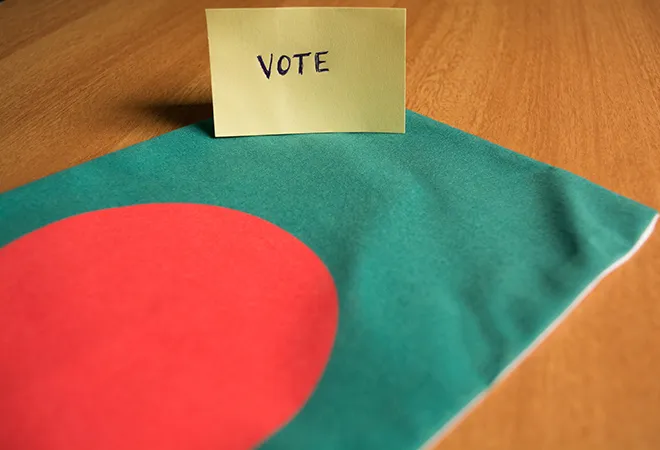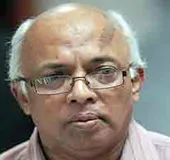-
CENTRES
Progammes & Centres
Location

Image Source: Lakshmiprasad S/Getty Images
Bangladesh’s Chief Election Commissioner K.M. Nurul Huda and Election Commissioner Mahbub Talukdar have been going disturbingly public over their disagreements on how the Election Commission has been conducting itself in the run-up to the voting for a new parliament on 30 December. It is an unprecedented situation, given that such spats in public between leading figures in the country’s electoral body have never been experienced before. Mahbub Talukdar, whom many consider to be leaning toward the opposition Bangladesh Nationalist Party, has over the past couple of months been in the news owing to his walkouts from meetings of the EC when his suggestions relating to a smooth and fair holding of the election, as he put it, were brushed aside by his colleagues. Talukdar then made it a point, again quite unusual, of informing the media about the incident.
The latest disagreement between the CEC and Talukdar --- and both men are former civil servants ---stems from the latter’s public statement that the Election Commission has not ensured a level playing field for all political parties in the campaign for the general election.
Nurul Huda clearly took umbrage at the statement and in equally public form made it clear that Talukdar had not been speaking the truth. In his turn, Talukdar went before the media again, to inform them that he considered the CEC’s labelling him a liar an insult to his person. And then, quite injudiciously, Obaidul Quader, a senior minister and general secretary of the ruling Awami League, leapt into the scene. At a campaign rally in his constituency, he proffered the argument that when four of the five election commissioners, including the CEC, are in unanimity over the performance of the Election Commission, the dissenting opinion of the fifth one did not matter. All of this, first the public airing of differences between Huda and Talukdar and then the minister’s taking up the subject, has raised eyebrows. Talk shows on the nation’s television channels have zeroed in on the controversy.
If the turmoil in the Election Commission is one of the spectacles the public are being made to observe just days before voting takes place, there are other facets of the campaign that cannot be ignored. The Election Commission, which theoretically has authority over the police and other security agencies till the voting, has quite been unable to enforce its authority in situations where opposition activists have come under attack, the consequence being that the opposition has found it hard to organise its rallies in the way it would like to. Only the other day, the EC decreed that while the opposition, now in the shape of the Jatiyo Oikyo Front, or national unity front, is free to use the sheaf of paddy as its electoral symbol, it cannot use portraits or images of Khaleda Zia, the jailed former prime minister and chairperson of the BNP, in the campaign. No explanation was offered behind the decision. For her part, Prime Minister Sheikh Hasina has sounded the alert that the BNP is engaged in preparing false ballot papers for election day, a charge the BNP has indignantly denied.
The opposition is essentially struggling to make the best of a tough situation for itself. The general feeling in Bangladesh at this point is that Prime Minister Sheikh Hasina and her party will return to power for a record third consecutive term in office.
The euphoria among Awami League workers and supporters is palpably visible, with hordes of artistes, journalists and superannuated police, military and civil administration officials making a beeline to the ruling party office to express their support for Sheikh Hasina. A large body of business people, in formal manner a few days ago and in the presence of Sheikh Hasina, voiced their support for her government, pledging to ensure her party’s return to power. Indeed, social media have in these past couple of weeks been replete with bands of Awami League enthusiasts rooting for the boat symbol of the party. The government has been focusing on the development projects it has implemented in the last ten years, warning people that a return to power by the BNP and its allies would not only bring the projects to a sudden end but would also pull the country into a negative and necessarily regressive direction.
The Awami League is therefore in upbeat mood, its happiness going up a few notches with the entry into it by Enam Ahmed Chowdhury, till recently in the BNP and a former advisor to Khaleda Zia. Chowdhury, a former civil servant, has had a long association with the BNP and has been a vocal defender of the party, which is why his desertion of it at this point has surprised political observers. Chowdhury’s late brother Faruk Ahmed Chowdhury, who served in senior diplomatic positions for Bangladesh, was associated with the Awami League. Another brother, Iftekhar Ahmed Chowdhury, was foreign affairs advisor in the military-backed caretaker government led by Fakhruddin Ahmed between January 2007 and January 2009.
A key feature of Bangladesh’s politics in these past couple of decades has been the intense degree of interest demonstrated by western diplomats in the state of democracy in the country.
American and European Union diplomats have repeatedly emphasized the growth of a stable political order and toward that end have exchanged opinions on a regular basis with Bangladesh’s journalists and members of civil society. In terms of regional as well as global politics, such demonstrations of interest in a country’s politics would be regarded as unwarranted interference. Not so in Bangladesh, despite the disapproval such moves generate among citizens. On Thursday, it was the turn of the new US ambassador to Bangladesh to invite the chief editors and editors of Bangladeshi newspapers to his residence for an exchange of views. A whole crowd of those invited turned up.
Meanwhile, ruling party figures and their followers are already proffering opinions on the shape of the Awami League government on the morning of the day after the election of 30 December. For them, the re-election of the party to power is a distinct possibility, perhaps even a formality.
The views expressed above belong to the author(s). ORF research and analyses now available on Telegram! Click here to access our curated content — blogs, longforms and interviews.

Syed Badrul Ahsan is a Senior Journalist and Commentator on South Asian affairs based in Dhaka. Ahsans entry into full time journalism came about through ...
Read More +